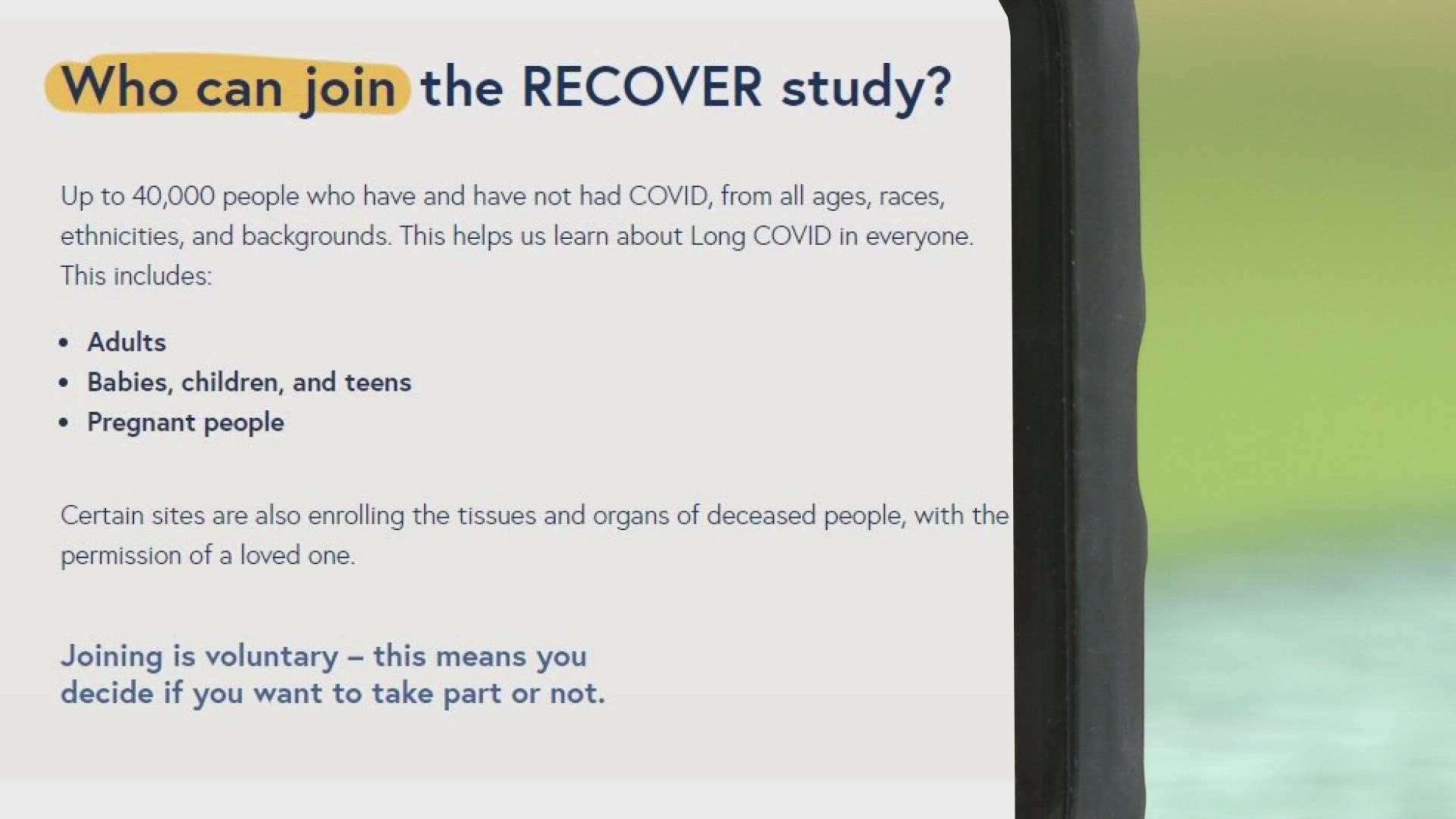AURORA, Colo. — A study looking at the long-term side effects some patients are facing months after a positive COVID-19 test, a condition often called long COVID, is searching for more participants.
Researchers partnering with the National Institutes of Health (NIH) hope to have 40,000 people enrolled in the nationwide study by the end of the year.
Dave Nothstein is one of the participants in Colorado hoping his data can help others.
"Every day is just a struggle to get through," Nothstein said.
Nothstein said he has battled extreme fatigue, brain fog and body aches for months. He's had to scale back his hours at work and can no longer hike or bike like he used to.
"Right now my adventures include going to the mailbox and walking the dogs to the top of the hill because that's all I can really handle," he said. "It's taken this huge world and made it very small."
University of Colorado Anschutz Medical Campus is one of the locations partnering with NIH for the study. 9NEWS spoke with Dr. Kristine Erlandson, who is overseeing the study there.
Note: Answers are edited for length and clarity.
9NEWS: What is the Recover study?
Erlandson: Recover is a nationwide study funded by NIH enrolling about 18,000 people who have either had COVID and have long-term effects of COVID; who have never had COVID or who have recently had COVID; and also people who had COVID who never developed long-term effects. So pretty much anyone.
What is its purpose?
Erlandson: We’re trying to understand a little bit of the risk factors of who goes on to develop long COVID symptoms after they had an initial COVID infection, and then try to understand the mechanisms. Is it high levels of inflammation? Is it demographic features? Are women more likely to have long COVID?
We’ll also be able to understand more about how vaccination status may be protective against developing long COVID.
What are some of the common symptoms of long COVID?
Erlandson: I’d say fatigue is one of the most common factors when it comes to the initial COVID infection. Some people go on to have fatigue for months following their initial infection, and sometimes even years.
Brain fog, or even confusion, and brain fatigue sometimes seem to be very common.
Then there are some strange things like difficulty sleeping, cardiac problems, exercise intolerance and maybe even some gastrointestinal effects. There are a lot of new symptoms we keep discovering, and some we’re not really entirely sure if we can relate to COVID or not.
What’s really interesting is sometimes those symptoms aren’t even related to the initial severity of COVID. So we’re seeing people who had a positive COVID test but didn’t have symptoms, or a very mild case of COVID following their infection, and then they may go on to develop symptoms months after their initial infection. Others may have a severe course initially, and they never get over their initial symptoms.
Is the study looking for more participants?
Erlandson: The study wants about 25% of participants enrolled who had COVID previously and are at least a month out from their initial infection. Some of those may have long COVID symptoms, and some of those may be completely resolved. About 60% of the target of the overall cohort is actually enrolling people at the time of their COVID infection.
That group is really valuable because we can understand what happens at the time of a COVID infection, if there are immune markers or certain things in the blood that can help us to determine who goes on to develop long COVID. So that’s the group we’re really targeting right now.
We need to get them in for their visit within four weeks of their positive test.
What does participating entail?
Erlandson: We collect data on participants four times a year. Some of those visits can be virtual, once we collect some of the initial data. For the participants enrolling at the time of their initial infection, we’ll collect bloodwork for the first three visits. The study lasts four years.
It’s certainly not something that we want to ignore. It’s something that we definitely recognize as a real problem and it’s going to be a major impact on generations to come.
SUGGESTED VIDEOS: COVID-19 Coronavirus

